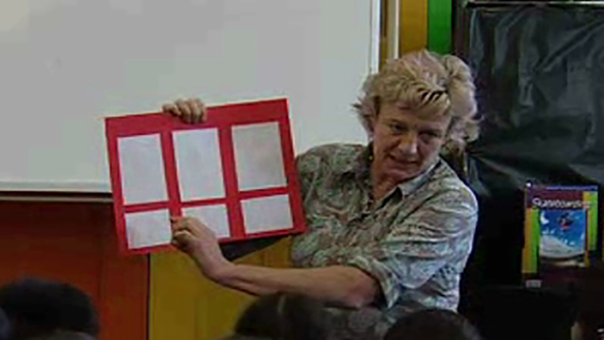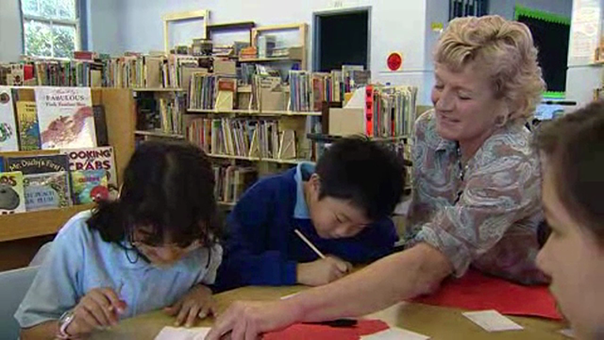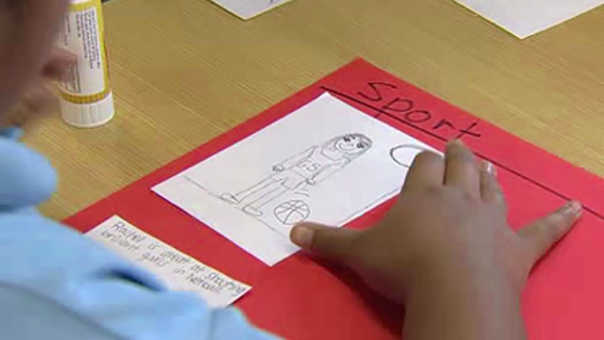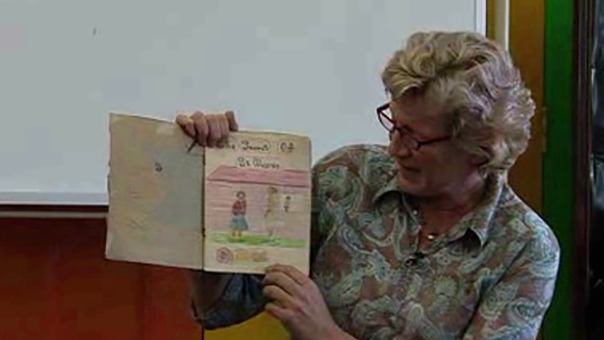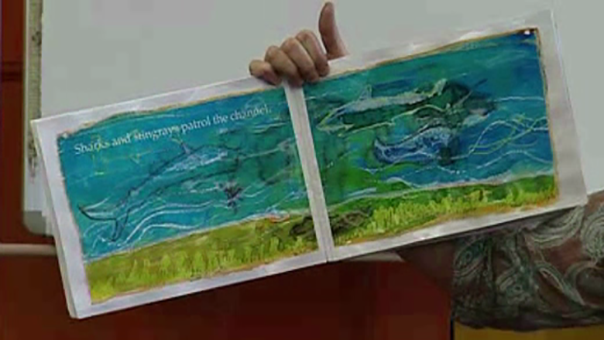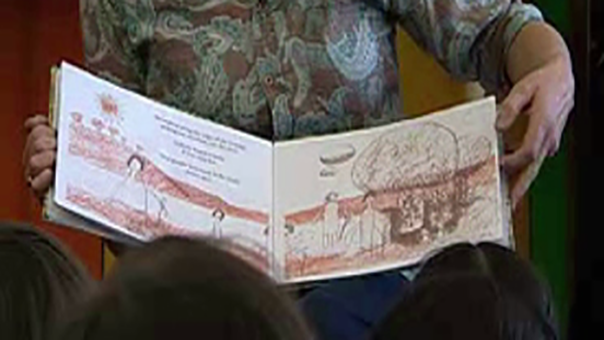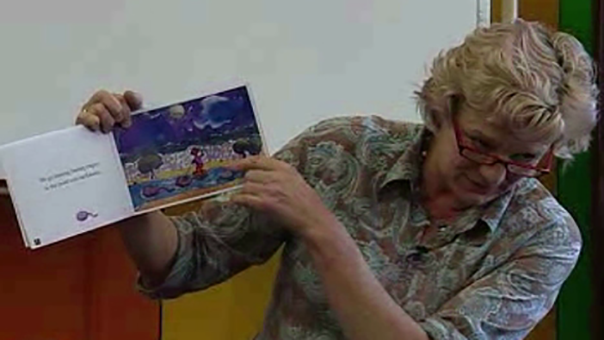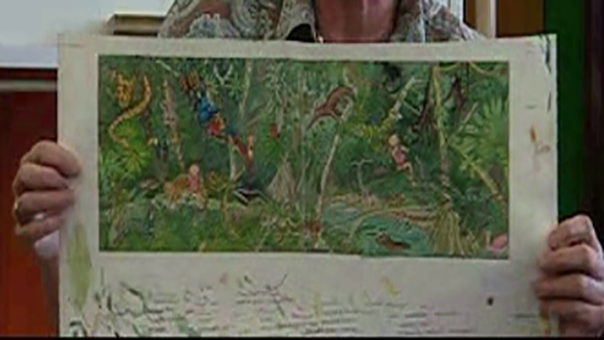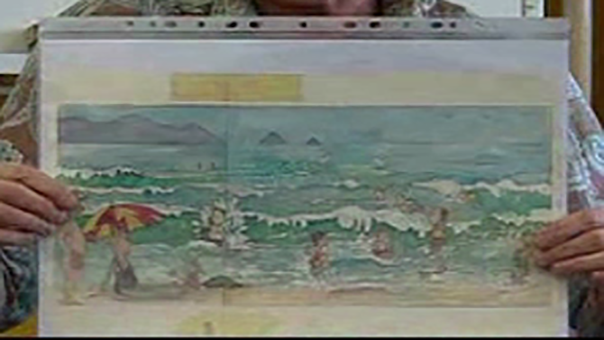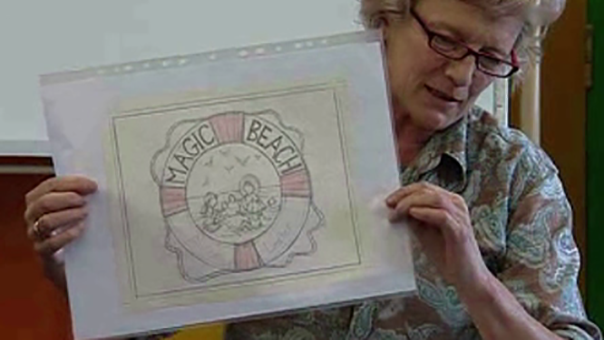2. Creating a class book - Planning

Viewing guide
Teacher to:
-
explain that the class will be making a book together by following along with Alison Lester as she teaches another class how to make a book.
Students to:
-
discuss the good points and possible problems with creating a book this way
-
discuss the audience for their class book, how does thinking about the audience change what information you decide to include?
-
record the categories and activities generated by the class in their book creating journal after the activity.
Teacher to:
-
take on the role of Alison Lester and elicit responses from the students or assign roles to the class so that they work together to recreate Alison’s process
-
ensure that students are creative in choosing categories and activities, prevent class from replicating content shown in the video.
This lesson is designed to begin the process of creating a class book. Students start by working together to plan out their book. Depending on the ability level of the class, this video, and associated activities, can be combined with some of the later videos to create one lesson
Audience
Thinking about the audience is key to planning. Giving purpose to this activity by producing the class book as a gift or communication to another group of children will produce greater engagement in your students. They could create their book as a way to tell distant students about their school or life, like ‘Ernie plays the Didgeridoo’ does, or to entertain students in a younger class at their own school.
Using digital technology
Combining this and the later activities with digital technologies is simply a matter of asking students to produce their text and images using the technology and software available to your class. The book can be published for printing using presentation software such as Google Slides or Microsoft PowerPoint, as a website using Google Sites or as a multimedia document using Microsoft Sway. Images can be created and edited using Microsoft Paint, GIMP or Adobe Photoshop. You could also have students write and create their work on paper and then scan or photograph it to add it to a digital document.
Learning intention
Completing this activity affords students the opportunity to:
-
communicate effectively for a variety of audiences and purposes using increasingly challenging topics, ideas, issues and language forms and features (EN3-1A)
-
compose, edit and present well-structured and coherent texts (EN3-2A)
-
discuss how language is used to achieve a widening range of purposes for a widening range of audiences and contexts (EN3-5B)
-
optional - Learning across the curriculum: Information and communication technology capability.
Alison Lester: I reckon we could make a book too. Are you ready? Alright. Let's do a book about you. What sort of things do you kids do? Are you sporty kids? Would sport be a good category? I think we should maybe have four categories. So, if we had sport for one, what else could we have? What about food? Is food good?
Children: Yes
Alison: What else do you do? Families? Fun? Clothes?
Children: TV
Alison: Oh, TV would be just one thing like a ... games would be good, that's different to sport do you think? Or we'll put games in with sport? All right, games and what, one more, festivals maybe, or ... What?
Children: Vegetables.
Alison: Vegetables?
Children: School.
Alison: School would be good, okay. So we need six different things for sport. Who does an interesting sport?
Girl: Soccer
Alison: What's your name?
Girl: Naomi.
Alison: So could we say, 'Naomi plays soccer?' Or, 'Naomi scores at soccer' would sound better, wouldn't it? I'll just put 'Naomi and soccer.' Who else does a good sport? Yeah?
Girl: Tennis.
Alison: Tennis. What's your best shot?
Girl: Backhand.
Alison: Backhand. And what's your name?
Girl: Tahlia.
Alison: So, could I say Tahlia, you could write 'Tahlia smashes a backhand.' Who hasn't got one yet? Think, think. It could be food, games, school. Yep?
Girl: Netball.
Alison: Ah, I'm a netballer too. What's your name?
Girl: Rachel.
Alison: I bet you're good, are you? Are you a goaler or a defender?
Girl: I don't know, I just like playing it.
Alison: Ah, good. What's your name again?
Girl: Rachel.
Alison: Yeah?
Girl: Does reading count as school?
Alison: Yeah, reading would be good. What's your name?
Girl: Nancy.
Alison: Nancy. Any other good school ones? If you haven't got one it doesn't have to be your most favourite thing of anything. Yeah?
Girl: Food. Pizza.
Alison: Pizza. What's your name?
Girl: Gloria.
Alison: Who's left? Put your hand up if you haven't got one yet. What's yours?
Child: KFC
Alison: KFC. What's your name?
Child: Sala
Alison: Yep.
Girl: Writing.
Alison: Writing. Like creative writing?
Girl: Yeah.
Alison: What's your name?
Girl: Sarah.
Alison: Sarah, creative writing. Okay, do you reckon everyone's ready to go

